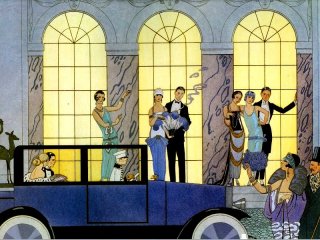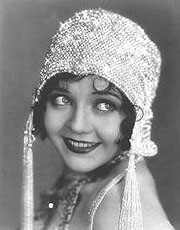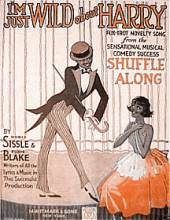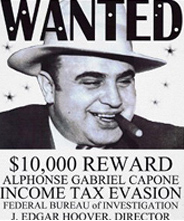Jazz Age Culture
Part I

Jazz and the Harlem Renaissance
Prohibition, Racial Violence, and Crime
Nichols Home Page // Jazz Age Part II // Jazz Age Writers

Flapper Girl (1920s photo)
"Hip flasks of hooch, jazz, speakeasies,
bobbed hair, 'the lost generation.' The
Twenties are endlessly fascinating. It was
the first truly modern decade and, for better
or worse, it created the model for society
that all the world follows today." (from Kevin Rayburn,
"Two Views of the 1920s.")
"[The flapper] symbolized an age anxious to enjoy itself, anxious to forget the past, anxious to ignore the future." (from Jacques Chastenet, "Europe in the Twenties" in Purnell's History of the Twentieth Century)
"It was during what we might call the Flapper period . . . that American popular culture began to capture the imagination of the world. . . . [America] was inventing its own modernity. . . . " (from Laura Mulvey, "The Flapper Phenomenon")

"I'm Just Wild about Harry" (1921),
song by Eubie Blake & Noble Sissle
from Broadway show Shuffle Along.
"Harlem was not so much a place as a state of mind,
the cultural metaphor for black America
itself."
(from Henry Louis Gates Jr., Rhapsodies in Black, 1997)
"The true spirit of jazz is a joyous revolt from convention, custom, authority, boredom, even sorrow--from everything that would confine the soul of man and hinder its riding free on the air." (from J.A. Rogers, "Jazz at Home," The Survey Graphic, 1925)
"But jazz to me is one of the inherent expressions of Negro life in America; the eternal tom-tom beating in the Negro soul--the tom-tom of revolt against weariness in a white world, a world of subway trains, and work, work, work; the tom-tom of joy and laughter, and pain swallowed in a smile." (from Langston Hughes, The Negro Artist and the Racial Mountain")

Al Capone wanted
for tax evasion
"Mr. Steve Phillips, of the "Shades of Death," ... announced that he ... would never sell anything intoxicating in Xenia again. Then the ladies, joined by the spectators, sang "Praise God from whom all blessings flow" ....[A]ll the bells were set ringing in honor of the first victory.
(from "Woman's Crusade of 1873-74")
"Prohibition clearly benefited some people. Notorious bootlegger Al Capone made $60,000,000...that's sixty million dollars...per year (untaxed!) while the average industrial worker earned less than $1,000 per year." (from "Prohibition: The Noble Experiment")
"By the end of the 19th century, lynching was clearly the most notorious and feared means of depriving Blacks of their rights." (from "The Anti-Lynching Crusade of Ida B. Wells")

Go to Jazz Age Part II or Jazz Age Writers
Return to Nichols Home Page
Image, top of page: "Farewell" (1920) by Georges Barbier